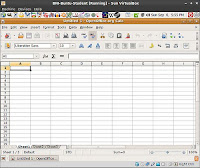First things first -- new loan amounts in the box at the right. We knocked another $245.20 off the loans, which isn't a great amount, but every little bit helps. Also, at my sister's request, there will soon be, in addition to the red "amount remaining" numbers, a green "amount paid" number, just to keep track of where we've come from.
Now, here's today's problem:
Over the past week and a half, I've sent in 4 payments against our mortgage principal, totaling just over $1,100. All of them were put "in suspense", which sounds like something they'd do on a sci-fi show when they can't save someone's life with the technology on hand. It sure didn't sound to me like something they should be doing to my extra mortgage payments, especially not that many of them for that much money.
So, what's the problem? The problem was I was taking good financial advice and following it blindly, without remembering that I need to be using my own head, too. I'm a big fan of David Bach, and especially his book
The Automatic Millionaire (I soon hope to have a "recommended reading" list at right, as well). He says the way to get wealth for most people is to automate as many facets of your financial life as you can -- this includes direct depositing into savings, automatically paying bills and utilities, everything.
Like a good financial disciple, I set up all my payments automatically (except for our water bill, which is different every month and charges for automatic deduction). I've done things that way for years and it's always worked well.
Until this week. When I saw my first principal payment go into suspense, I thought,
Hmm, that's odd, but as it was only $100, I let it lie. When the next one for $109 did the same thing, I started to get an idea of the problem: our regular payment is deducted on the 5th of the month (or later if the 5th isn't a business day), and until they had that payment, they were going to hang or to our money "in suspense".
Well, the suspense was killing me, so after seeing our regular payment post with everything going where it should, and my other payments still just hanging around, I called the mortgage company. I spoke to a very nice young lady whose name, sadly, I don't remember -- one of the nicest encounters with a customer service rep at a financial company I've had. She put through the paperwork (or electronic equivalent) to get those monies out of suspense, which they won't be until Friday (small
grr...).
I then asked when they would have been applied to principal had I not called, and she told me that they would have all been "swept up" and put toward principal "in a couple of weeks" (much bigger
grr...)
A couple of weeks? When they calculate the interest on the daily average, those couple of weeks add up to several bucks. If I'd wanted them applied in a couple of weeks, I would have
sent them in a couple of weeks.
So, it occurred to me that I should take my financial destiny in my hands, and with all due respect to Mr. Bach, I canceled our automatic drafts. No more hovering in limbo about when they're going to take out my payments -- I'll know
exactly when they are because I'll be the one sending them, and because of that, I won't have any more of my hard earned dollars in their hands, living on life support.
Anyone out there have any Sound Financial Advice they've bucked in favor of their own good ideas? Share them in the comments section below!
 What is the experiment, you ask? Here you can see our pantry -- I dare say ours is not much different-looking than yours: all manner of boxed, bagged, and canned goods you've bought up to keep for a rainy day, then neglected to eat. Our freezer looks much the same way -- frozen dinners, chicken, cheese, and whatnot, all just sitting there waiting for us. Despite having all that sitting there just waiting for us, we still go to the grocery store once a week and plunk down $50, $70, $100 dollars for new food.
What is the experiment, you ask? Here you can see our pantry -- I dare say ours is not much different-looking than yours: all manner of boxed, bagged, and canned goods you've bought up to keep for a rainy day, then neglected to eat. Our freezer looks much the same way -- frozen dinners, chicken, cheese, and whatnot, all just sitting there waiting for us. Despite having all that sitting there just waiting for us, we still go to the grocery store once a week and plunk down $50, $70, $100 dollars for new food. 








